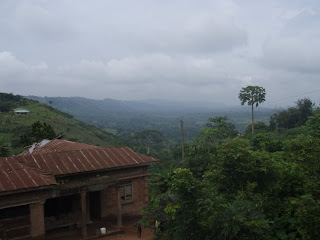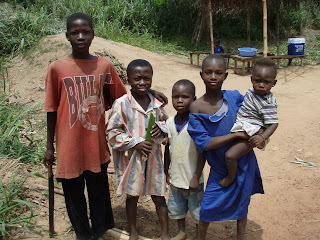
Once this kid got a look at me, it was locked on for almost the entire half hour ride.
Just some more observations on the nuances here for the people in USA...
I supremely regret saying anything negative about the food here, because my first experience wasn't exactly, oh I don’t know, um, solid? Sorry for that, but this week involved a sit down every day at a chop bar where they serve all kinds of local preparations (fufu included). On my first return to a chop bar, I only did it because I nice young lady greeted me with a wide grin and an awesomely typical Ghanaian attitude and said, come eat some food. I was hungry, thought about it for a couple seconds but was taken in too much by the greeting to refuse. A serving of beans and rice cooked together, tomatoes, onions, garlic, green peppers, a hardboiled egg, pepe (the typical spicy sauce) and 50 cents later, I was loving life. There’s nothing like getting great food for 50 cents.
Moving on, as I was riding home today I thought about how stellar the music is on the tro-tro. And when I say stellar, I mean in a way that you can’t get anywhere else that I know of. It’s the happiest Reggae music ever made…multiplied by a factor of Jesus. If I haven’t mentioned it, Jesus is everywhere. He’s the name of your local shop, hanging from almost every taxis rear view mirror and his words are plastered on every, tro-tro’s back window. But the music, you can’t beat the music.
Lastly on the observations, the friendly monikers over here are hard to beat. An older man is “father” (pronounced fada), an older lady sister (sistah), if youre a young dude you’ll be called brother…but also hugo. Hugo? But last is my favorite, if you see a young woman you can go ahead and call her mommy. Man, that kills me every time. “Hey mommy, you forgot your change.” It’s not demeaning it’s just how it is. Ghanains additionally make two of THE most annoying sounds known to human beings. It’s either a) a cross between a hiss and a whistle that I still cannot do myself or b) the most awful sound that can only be described as identical to the noise you here when you’re walking around in Europe and those people are trying to sell you these balls that they throw up in the air which makes a sound of which only Lloyd from Dumb and Dumber and could be proud…And yet they make it hear all the time, with their mouth. I’ve tried reproducing it, but it’s impossible.
On to the work…Today, Friday, was another productive day on the research front speaking with a rural bank and the apex of the credit unions. Getting to speak to rural banks is awesome and by the time I leave I’m always giddy. Meetings with them always give a special excitement to the research I’m doing. It’s like when you’re at camp (like High Five sports camp for example, great camp, even better logo…should’ve been called High Entire Forearm camp) and the counselor comes along and is giving out popsicles…and you get the red one. Getting information from a credit union, yea its more like getting the green one, you’re a little bummed because you got the worst color, but you’re still psyched…I mean, it's a popsicle, right? I’ve really only struck out twice with blind refusals of my research and both times it’s been at the hands of credit unions, but speaking with someone at the Credit Union Association today still proved that there is much to offer in their strictly member-run and elected organizations. The reason the rural banks are so great is that it’s always tough to get to them, hence them being rural, but it has always been well worth the trip. They’re unbelievably welcoming to someone attempting to learn more about rural banks and when I ask questions, they’re always willing to expand. Today, the manager gave me a more hands on tutorial of how it’s done, how claims are processed, applications for the overdraft, account statements, the works. Oh, and the first thing he said we met with a big smile (which a bunch of people say here when I get back from work). You’re welcome. Nothing makes me feel more welcome here than when someone actually says ‘you’re welcome.’ Rural bank operations are not easy going, especially with the lack of adequate infrastructure in rural areas of
Wow, this has been a post with no pictures and I imagine a bit too much platitudinous text. Many Apologies.





























